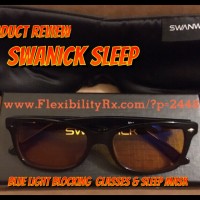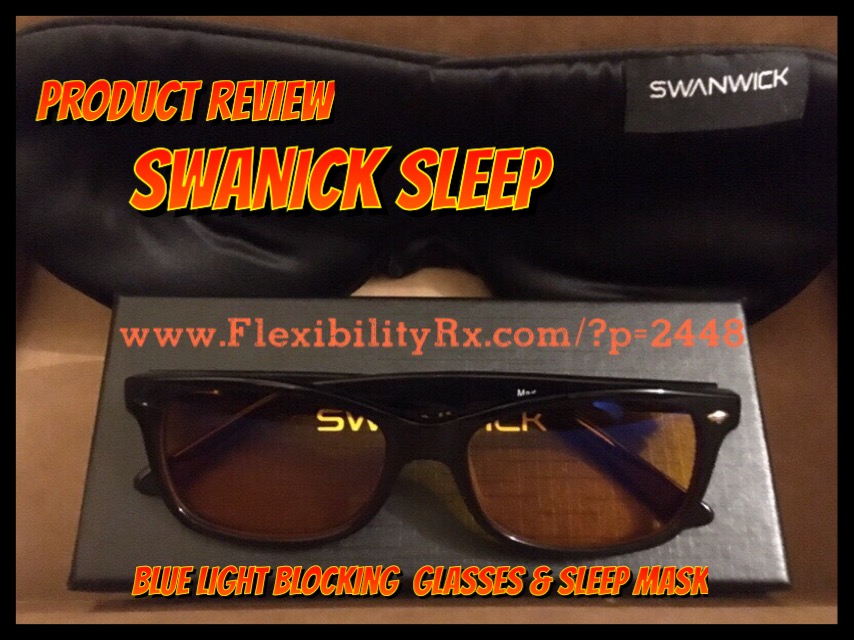
Swanick Sleep
Blue light exposure at night presents many health risks including increased risk of various cancers, weight gain, diabetes, cardiovascular disease, and damage to the eyes.
I just received my Swanick Sleep blue light blocking glasses and sleep mask in the mail. My intention was not to use these every day but to have them on hand for when I cannot control my environment. There are steps that I have already taken to minimize blue light exposure at night but sometimes it cannot be avoided.
If you haven’t heard of the dangers of nighttime blue light exposure check out this link below.
Consequences of Nighttime Blue Light Exposure
Disrupts our circadian rhythm (our biological clock)
Harmful to the eyes (damages DHA fatty acids in the eyes)
Affects pineal gland shutting down melatonin production
Negatively affects mitochondrial function
Triggers a hormonal ‘perpetual summer’ raising carbohydrate cravings
Personally, I find that I am ‘wired’ at night when exposed to too much blue light and cannot sleep. Measures that I have taken to minimize blue light exposure are installing blue light blocking programs on my electronic devices and completely darkening my bedroom. I avoid electronic devices 60-90 minutes before bed and try my best to get adequate sunlight exposure during the day to support a normal circadian rhythm.
When traveling I carry a small roll of black electrical tape to cover up blue light emitting devices. However, the sleep mask is a great way to maximize sleep quality on the go.
Measures to Protect Against Blue Light
Blackout curtain in the bedroom
Black electrical tape for chargers, outlets, electronic devices
Activate Night Shift on your iPhone
Install a blue light blocking program like F.LUX or IRIS on your computer
Travel with a sleep mask
Blue light blocking glasses
It seems like Swanick Sleep runs regular sales on their products if you sign up for their newsletter. I used a 20% OFF coupon on my order.
I know that for some people the glasses may seem too expensive – if you are not willing to make the investment in these glasses there is a $10 option on Amazon that Dr. Mercola has recommended:
https://www.amazon.com/Uvex-S1933X-Eyewear-SCT-Orange-Anti-Fog/dp/B000USRG90/ref=sr_1_1?ie=UTF8&qid=1460975572&sr=8-1&keywords=uvex+s1933x+skyper+safety+eyewear+black+frame+sct-orange+uv+extreme+anti-fog+lens
However the Swanick Sleep glasses are very well made, comfortable, and sleek. They offer a variety of options on their site, even offering Fitovers that you can wear over your prescription or reading glasses.
One of the most important investments you can make is selecting a good mattress to ensure good sleep at night. Spending some money to eliminate blue light from your environment at night is equally important.
“Some studies suggest a link between exposure to light at night, such as working the night shift, to some types of cancer, diabetes, heart disease, and obesity. That’s not proof that nighttime light exposure causes these conditions; nor is it clear why it could be bad for us. But we do know that exposure to light suppresses the secretion of melatonin, a hormone that influences circadian rhythms, and there’s some experimental evidence (it’s very preliminary) that lower melatonin levels might explain the association with cancer.
A Harvard study shed a little bit of light on the possible connection to diabetes and possibly obesity. The researchers put 10 people on a schedule that gradually shifted the timing of their circadian rhythms. Their blood sugar levels increased, throwing them into a prediabetic state, and levels of leptin, a hormone that leaves people feeling full after a meal, went down.
Even dim light can interfere with a person’s circadian rhythm and melatonin secretion. A mere eight lux—a level of brightness exceeded by most table lamps and about twice that of a night light—has an effect, notes Stephen Lockley, a Harvard sleep researcher. Light at night is part of the reason so many people don’t get enough sleep, says Lockley, and researchers have linked short sleep to increased risk for depression, as well as diabetes and cardiovascular problems.”
Blue light also has an immediate detrimental effect on our nervous system. Andreas Saltas, “The Bod Mechanic” shows in this video how blue light exposure throws the body into a sympathetic (fight or flight) nervous system state. Watch how this athlete’s shoulder immediately locks up after viewing his phone at night.
I highly recommend picking up a pair of these glasses from Swanick Sleep. The sleep mask is also very comfortable and I urge everyone who travels to pick up a sleep mask. Having flexibility in controlling your sleep environment is essential to sleep quality and recovery.
Resources
https://www.swanwicksleep.com
https://articles.mercola.com/sites/articles/archive/2016/05/05/blocking-blue-light.aspx
https://articles.mercola.com/sites/articles/archive/2017/04/19/light-pollution.aspx
https://www.amazon.com/Lights-Out-Sleep-Sugar-Survival/dp/0671038680/ref=sr_1_1?ie=UTF8&qid=1515856183&sr=8-1&keywords=lights+out+sleep+sugar+and+survival
https://www.flexibilityrx.com/overlooked-ways-of-getting-better-sleep-sleep-smarter-book-review/
https://www.health.harvard.edu/staying-healthy/blue-light-has-a-dark-side
– Kevin J. Kula, “The Flexibility Coach”

Leave A Reply (No comments so far)
You must be logged in to post a comment.
No comments yet